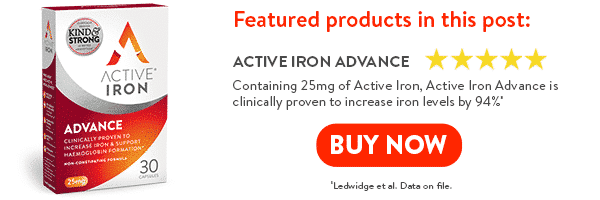- Iron supplements for blood donors
- Oral iron supplements
- Do Iron Supplements Cause Constipation?
- Iron supplements for athletes
- The best iron supplements for vegetarians
- The best iron supplement for sensitive stomach
- Benefits of iron for your immune system
- How to take iron supplements for best absorption?
- What does iron saturation mean?
- What is the Function of Iron in our Bodies?
- Iron supplement side effects
- How Much Iron Per Day for a Woman?
The truth about iron supplementation and constipation
It is estimated that 8 out of 10 people struggle with the side effects of iron supplements¹, with constipation being one of the most common side effects. As a result, up to 50% of people stop taking them², meaning they often struggle on with the common symptoms of low iron such as tiredness and fatigue. In this article on iron supplements and constipation, we’ll cover the following key topics and frequently asked questions:
- The importance of iron
- How can we increase our iron intake?
- The side effects of iron supplementation
- Why some iron supplements cause constipation
- Advice on preventing constipation
- A non-constipating alternative for iron supplementation
Iron is an essential nutrient that supports many vital physiological functions such as the production of haemoglobin, immunity, and cognitive function. Common symptoms of low iron include fatigue, dizziness, brain fog, headaches and potentially a higher susceptibility to infection. Our bodies cannot naturally produce iron, therefore we must absorb it through our diet, or with supplementation. The consumption of iron-rich foods such as liver, red meat, nuts, beans, and fortified cereals are a good way to increase your iron intake. However, often it is required to supplement your diet with oral iron tablets if you are at risk of low iron.
Unfortunately, there are several debilitating side effects commonly associated with oral iron supplements. These can include nausea, cramping, diarrhoea, bloating and constipation. However, Active Iron’s Kind & Strong formula allows for consistent supplementation over time whilst helping to avoid the unpleasant symptoms.

Why do some iron supplements cause constipation and how to prevent it?
Iron can be difficult for the body to absorb, hence why there are many people with insufficient levels worldwide. Traditional oral supplements contain a high dose of iron to increase the likelihood of absorbing the daily requirement of iron (which varies depending on age and gender) and to ultimately restore their levels. It’s widely reported that only 5-35% of ingested iron is absorbed which in turn results in high amounts of unabsorbed iron in the body. This excess iron in the digestive tract is the cause of the gastrointestinal (GI) related side effects associated to supplementation including constipation.
There are several suggestions as to how exactly the excess iron is leading to constipation. There is evidence that proposes that the high level of iron from supplementation causes an osmotic effect which pulls water away from the lower GI tract and into the stomach. This results in stools becoming dehydrated, harder, smaller and in turn more difficult to pass. A change in gut microbiota has also been linked to constipation. Excess iron is thought to promote the growth of Protebacteria, a species of bacteria in which is frequently found in patients suffering with chronic constipation.
Thankfully, there is plenty to consider when taking iron and how to maximise absorption while also avoiding sickness. Below are some summarised tips to consider when supplementing with oral iron and how to specifically alleviate the symptoms of constipation:
- Including fiber-rich foods in your diet such as whole grains, legumes, fruits and vegetables can make stools easier to pass.
- Vitamin C. A glass or orange juice alongside your oral supplement promotes absorption and in turn can decrease the amount of excess iron in your GI tract.
- Stay hydrated. Insufficient fluid intake is a leading cause of constipation.
- Take your iron with meals. Iron is best absorbed on an empty stomach however to reduce side effects it can be taken with food or immediately after meals.
- Incorporate a probiotic to promote a healthy gut.
- Exercise or physical movement can stimulate healthy bowel movements.
Which iron supplement does not cause constipation?
Thankfully, Active Iron’s unique protein formula improves iron absorption and decreases the likelihood of unpleasant symptoms by traveling through the stomach and to the natural site of iron absorption – the small intestine. Therefore, the stomach is not exposed to excess unabsorbed iron. It’s non-constipating mechanism is clinically proven to deliver 2X better absorption³ and help avoid gut irritation. It is also proven to increase iron levels by 94% in 6 weeks⁴.
Crucially, this allows consumers to take Active Iron consistently over time while they may have had to stop taking alternative brands due to the severity of the side effects. There are a range of Active iron products available which cater to varying needs. There is also a range of Active Iron specifically tailored for use during pregnancy.
Conclusion: Iron supplements and how to avoid constipation
We have established that iron is essential to life as it plays a vital role in human health. Many people experience debilitating side effects, such as constipation, at the hands of iron supplementation to attempt to avoid iron deficiency and the knock-on health problems associated to it. Active Iron’s non-constipating formula that delivers 2X absorption offers a ‘strong and kind’ solution to this. It’s been reported that 8 in 10¹ users of alternative iron supplements report side effects and 50% of them stopping supplementation as a result². Active Iron stands for no compromise in relation to tackling low iron levels around the world and therefore has formulated a supplement that allows users to follow suit.
¹Evidence suggests 8/10 of those who take iron supplements report side effects.
²Tolkien et al. PLoS ONE 2015; 10(2): e0117383. doi:10.1371/journal.pone.01173832015.
³ Wang et al. 2017, Acta Haematologica, 138: 223-232.
⁴ Ledwidge et al. 2021, Data on file. doi: https://doi.org/10.1101/2021.09.01.21262983


